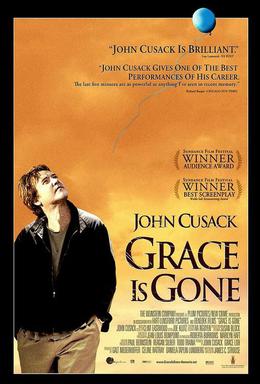Directed by
James Strouse, Grace Is Gone (2007) tells a story of how a family reacted towards
the loss of their love ones in war. In this case, Grace who was the wife of the
main character of this movie, Stanley Philips and a mother to 2 daughters Heidi
and Dawn died in a war. When the news was brought to Stanley he did not know
how to break it to the girls. When the girls returned from schools, Stanley
called the girls to the living room to talk to the girls about their mother’s
death. However, his intention was delayed when he saw how carelessly and happily
the girls were playing with each other as though nothing has happened. It was
then when Stanly decided to hold on to the news a little longer so that the girls
don’t have to face the grief of losing their mother so soon. In addition to
that, Stanley also gets to live as though his wife has never left when he was
with the girls.
In the
movie, Stanley agreed to a random suggestion by Dawn to visit the Enchanted Garden
which was few days drive away. When Heidi brought up reasons to oppose the
idea, Stanley replied by saying, “What if we did right now went to Enchanted
Garden? If that’s something you’d like to do why not?”. He also kept asking
what other fun activities the girls would like to do on their journey. It seems
to me as though Stanley was temporary trying to run way from reality by
engaging with something fun with that girls that can put his mind of the grief.
He even drove into the fields recklessly to tell Heidi who has been
overthinking in every action they did that when he was a teenager, he did what
he felt was fun without giving much thought about it. He taught Heidi lessons with
his actions rather than the usual parent-child lecture most conventional family
do.
While experiencing
grief, the feeling of anger, depression, despair, shock, and disbelief come
into the picture. Throughout the movie, after learning the loss of his wife,
Stanley was despair despite trying to act as though nothing has happened in
front of his daughters. This can be seen at instances when his facial expression
suddenly changes from a happily laughing with the girl to a heavy depressed expression.
Another example is seen when he cried at his mother’s place when the girls went
out to play with their uncle. Like many griever, Stanley was engaged in a
coping mechanism. He called home to listen to his wife’s voice mail recording
and talk to her on the phone. Stanley decision to bring the girls to the
Enchanted Garden was also a coping strategy that could bring him closer to his
wife as it was the last place they visited before she departed. Lastly, after
Stanley was ready to tell his daughters about their mother’s passing, he learnt
a new way of coping with the loss of his beloved wife from Dawn by having a
moment of silence to think about his wife when the digital watch rings.

When I first
watch this movie in KPD E, I actually fell asleep as the progress of the movie
was too slow. However, when I rewatched it at home, I was able to empathise
more with Stanley. I suspect the reason why I wasn’t interested in the movie
while I was in KPD E was because I was sitting around with friends, and my
protective mechanism was up against something that reminds me of the vulnerability
of the life of people around us. A lesson this movie taught me was that we can’t
run away from fear forever, we will eventually face them in order to move
forward in life.